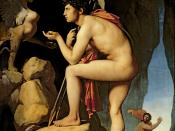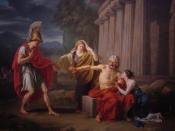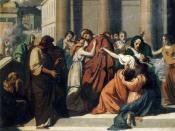A tragic hero, in the typical sense, ??is not a superman; he is fallible. The hero?s downfall is the result, as Aristotle said, of his harmartia; his error or transgression or (as some translators would have it) his flaw or weakness of character? every tragic hero has some fatal weakness, some moral Achilles heel, that brings him to a bad end.? Oedipus is the perfect example of a tragic hero in many senses of the term. A tragic hero is usually someone extraordinary rather than typical, someone who maintains a greatness of character, and is ready to give their life for some admirable cause.
Oedipus believed himself to be the son of King Polybos and Merope. Then as a young man, the oracle at Delphi informed him that he would eventually murder his father and marry his mother. After hearing this news he fled the country to prevent that fate, thus showing that he put other?s lives ahead of his own.
What he was unaware of was that his real parents were Iocaste and Laios. He then travels very far to solve the sphinx?s riddle and save Thebes, proving that he was no ordinary man. Because of his heroism he is named as the king of Thebes.
As a king, Oedipus? integrity only grows. Some twenty years later, Thebes is stricken by a plague. Oedipus tries everything to rid his people of this plague and finally finds a resolution from that same oracle that predicted his fate earlier in life. The oracle proclaims that he must seek out the murderer of the previous king, Laios. He declares that he will find the murderer and the punishment shall be exile of that man. With every step, it becomes more evident to all the characters and the reader that the killer of Laios is Oedipus. Persistently, he pursues his proclamation until he realizes that he must exile himself.
His persistence in the matter shows that although he is clearly at fault, he is willing to sacrifice himself for the good of his people. When his wife, Iocaste, discovers that she is married to her son, who has killed his father (her former husband), she hangs herself. After all of this horror, but before he is exiled, Oedipus gorges his eyes out, leaving himself blind to the tragedies around him. The irony is that although he is now blind, he can see the truth. His last concerns are for his daughters, not himself. He knows that only the Gods will rule him now, his fate has been predestined. And even though he wished he were never born to bring this curse upon his family, the good he brings to his countrymen can never be replaced.
Oedipus? hamartia seems to be the fact that he is relentless in his pursuit of the truth. However, this pursuit of the truth comes from some deeper flaw that causes his tragic end. From the very beginning of the story, one can see that Oedipus puts a lot of pressure on himself to personally solve every problem within Thebes; he needs everyone around him to look up to and respect him. When accused by Teiresias of murdering Laios, he grows very angry from public humiliation, even threatening to execute Creon. This aggressive need seems to be the true cause of his downfall.
Another character in literature with a similar hamartia is John from Brave New World. John is an exception to the typical character in that novel because he comes from another world. His endeavor to seek out truth and good in the people of the Brave New World leads him to drive himself crazy and eventually commit suicide. John?s self-flagellation is comparable to Oedipus blinding himself. John takes it upon himself to enlighten these people to the error of their ways, and at the same time puts his own life on the line. The government could easily have him put to death for his actions, however they merely send him away and leave him to his own devices.
Oedipus practically defines a tragic hero in that he rises to power through exceptional measures. He develops into an extraordinary man of great strength and character, but then with those same traits destroys all that he has worked for. Granted, the book blames his transgression on fate, but those same Gods who wrote his fate define his character as well. They may have designed his character so that it would inevitably cause such an outcome.






